Just because you don’t eat meat, doesn’t mean you can’t get protein! Chicken, fish, pork, and beef aren’t the only ways to get your protein count.
There are tons of vegetarian protein sources that you can turn to instead. Read our list of vegetarian protein options to find healthier, cruelty-free options that work for you.
And don't forget to scroll to the light green box towards the end of this post to download a free list of vegetarian protein sources printable for easy reference.
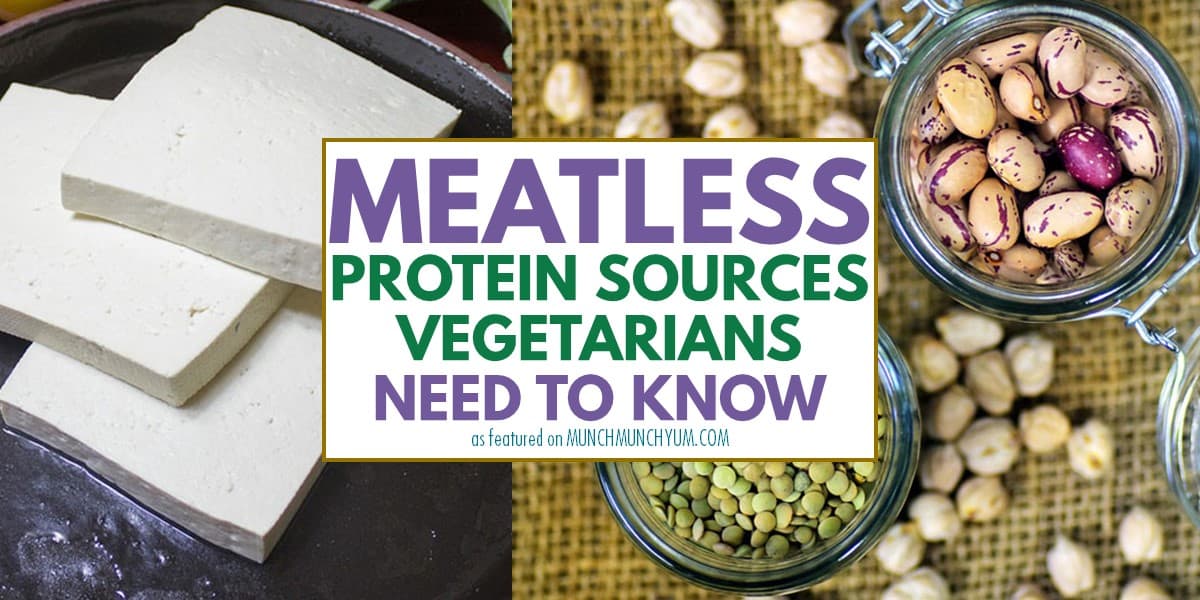
Disclosure: Opinions expressed are our own. If you buy something through any of our affiliate links on this page, we may earn a commission at no extra cost to you. Thanks for supporting our site!
Recommended products & ingredients
- Seitan* is one of the most concentrated sources of protein on this entire list
- Pumpkin seeds* are bite-size bits of protein that are easy to munch on
- Protein powder* is perfect for creating protein-packed meal replacements
Or check out these fun gifts for lovers of veggies!
Sources of vegetarian protein
Meat eaters aren’t even close to having a monopoly on protein!
In fact, as you might know from our ultimate vegetarian guide we vegetarians are probably better off with our protein sources because ours don’t come with the cholesterol and fat that is present most meat products.
Let’s check out the many options we have instead of meat, with protein counts provided by Very Well Fit Nutrition Analyzer.
Legumes
You actually get a two-for-one nutritional deal with legumes because they are high in both protein AND dietary fiber. What you don't get are fat and cholesterol, which come included with many meats.
As if that isn't enough, legumes are both cheap and versatile, making them nutritional all-stars for team veggie!
We have a list of some of the most protein-packed legumes below, based on cooked legumes (when they're uncooked, their protein count differs because the number of beans in a cup changes).
- Edamame* (28.6 grams per cup)
- Lentils* (17.9 grams per cup)
- Split peas* (16.3 grams per cup)
- Kidney beans* (15.4 grams per cup)
- Pinto beans* (15.4 grams per cup)
- Black beans* (15.2 grams per cup)
- Navy beans* (15 grams per cup)
Pro tip: Dried beans are the cheapest but require a lot more soaking and prep time so if you want something more convenient, going with low-sodium canned beans is a-ok!

Grains
Grains are another excellent way to satisfy your protein needs. There are a wide variety to choose from, all of which are super versatile, super healthy, and super protein-packed!
Check out the protein counts for these options, per raw cup of grain:
- Amaranth* (28.2 grams per cup)
- Quinoa* (24 grams per cup)
- Wild rice* (23.6 grams per cup)
- Millet* (22 grams per cup)
- Buckwheat* (19.2 grams per cup)
- Oats* (10.8 grams per cup)
Pro tip: As we've mentioned on other posts, a fun way to experiment on which grains you like best are to hit up the bulk bins are your local Whole Foods or Trader Joes.
You can grab just a single serving of each grain and see how you like it before buying a multi-serving bag.
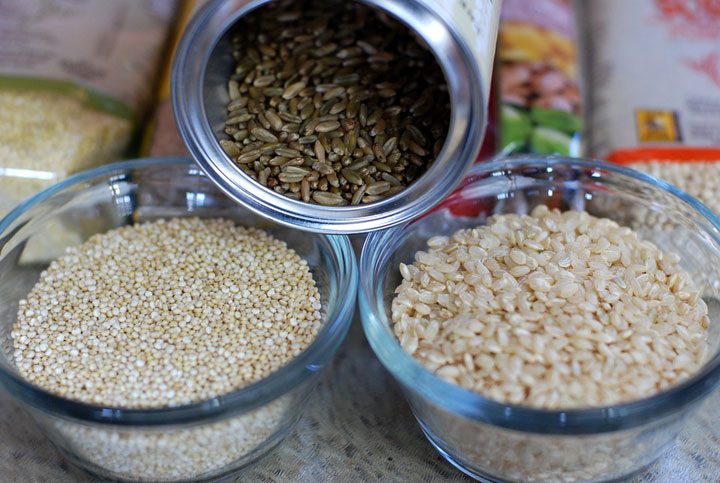
Dairy
Vegetarians can also turn to dairy products to get some of their protein intake.
Just be careful that you double check the ingredients, since some versions of these items (mainly the cheeses) contain either gelatin or are made with rennet.
Both of those are animal-derived, so you'll want to look for brands that are gelatin-free or specifically labeled as using vegetable rennet.
- Greek yogurt* (34.4 grams per cup)
- Cottage cheese* (31.1 grams per cup)
- Swiss cheese* (29.1 grams per cup)
- Cheddar cheese* (28.1 grams per cup)
- Mozzarella cheese* (24.8 grams per cup)
- Soy milk* (8 grams per cup)
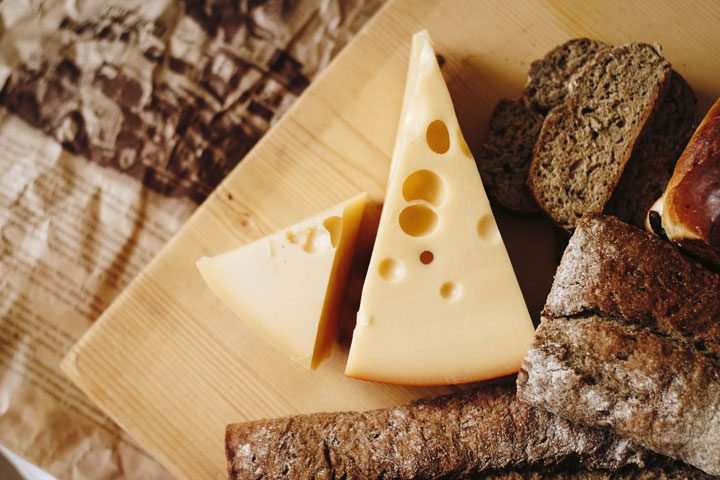
Nuts & Seeds
These guys may be little, but they pack a super powerful protein punch. Pound for pound, nuts and seeds are one of the best ways to add protein to your diet.
The nice thing about them is that they're super easy to incorporate into your diet. You can munch on them as a snack, or sprinkle them onto various dishes to add that extra pop of protein.
- Hemp seeds* (10.1 grams per ounce)
- Peanuts* (7.3 grams per ounce)
- Pumpkin seeds* (7 grams per ounce)
- Chia seeds* (6.3 grams per ounce)
- Almonds* (6 grams per ounce)
- Sunflower seeds* (5.9 grams per ounce)
- Flax seeds* (5.3 grams per ounce)
- Cashews* (4.3 grams per ounce)
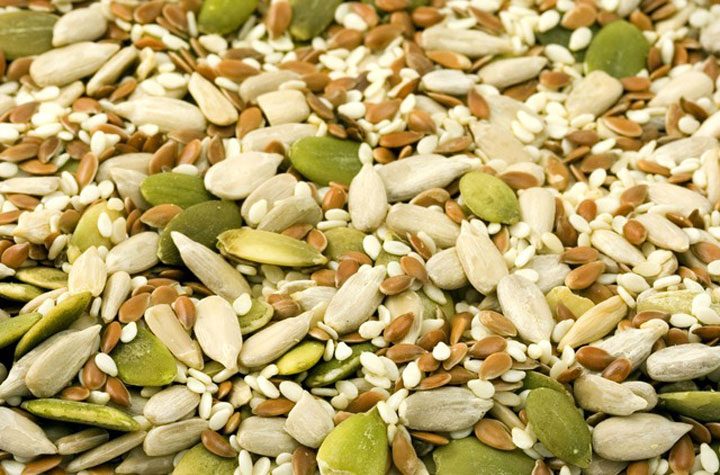
Other sources
Besides the protein sources we mentioned above, there are a few other vegetarian ingredients that can give you the protein you are looking for.
Seitan, TVP, and tofu are all made from soybeans, which are one of the most protein-rich vegetarian ingredients out there.
Protein powder allows you to create meal replacements that still pack protein, while eggs are a super kid-friendly option that can be prepared in tons of different ways.
- Seitan* (varies)
- Tofu* (10.3 grams per cup)
- Textured vegetable protein (TVP)* or soy protein isolate* (22.8 grams per ounce)
- Eggs (6.3 grams per hard-boiled egg)
- Protein powder* (varies, but usually around 20 grams per serving)

Free printable list of plant-based protein sources
Grab our free list of items to stock a plant-based pantry for meatless diets in the light green box below.
Grab This Freebie:
[Personal use only. To help us continue to offer this free resource to others, please share this post (not the direct file) before going to the printable. Thank you!]
Share This: Save Pin | FB Share
Get Free Printable: Get the File
Conclusion
Although meats often hog the protein-spotlight, there are plenty of vegetarian ingredients that can easily fulfill your protein needs within a plant-based diet.
We found a whole slew of vegetarian protein options that make it easy for you to ditch the meat, without losing out on protein.
Check out our extensive list of vegetarian protein sources, which will give you plenty of food for thought...and protein of course!
More Vegetarian Resources and Kitchen Tips
See all tasty vegetarian recipes →



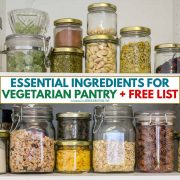

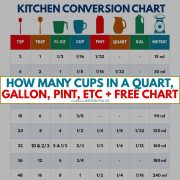

Vicki Toscan says
Very good